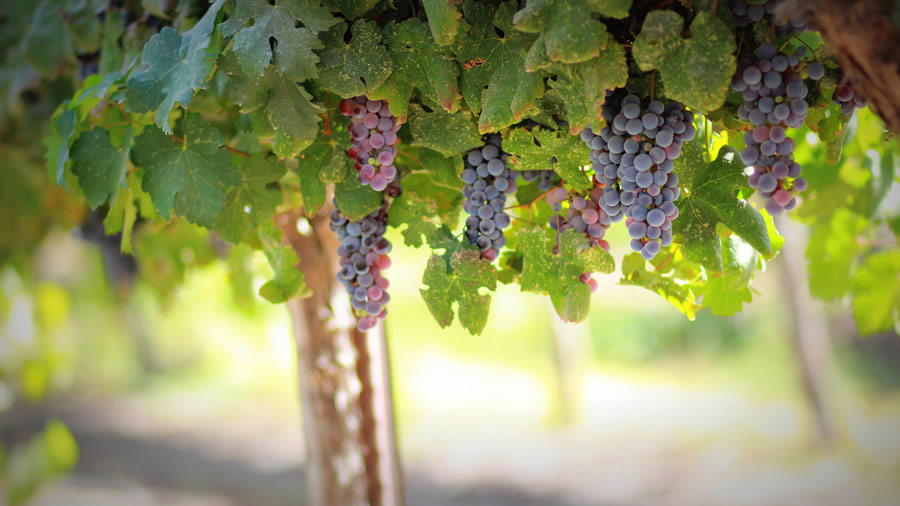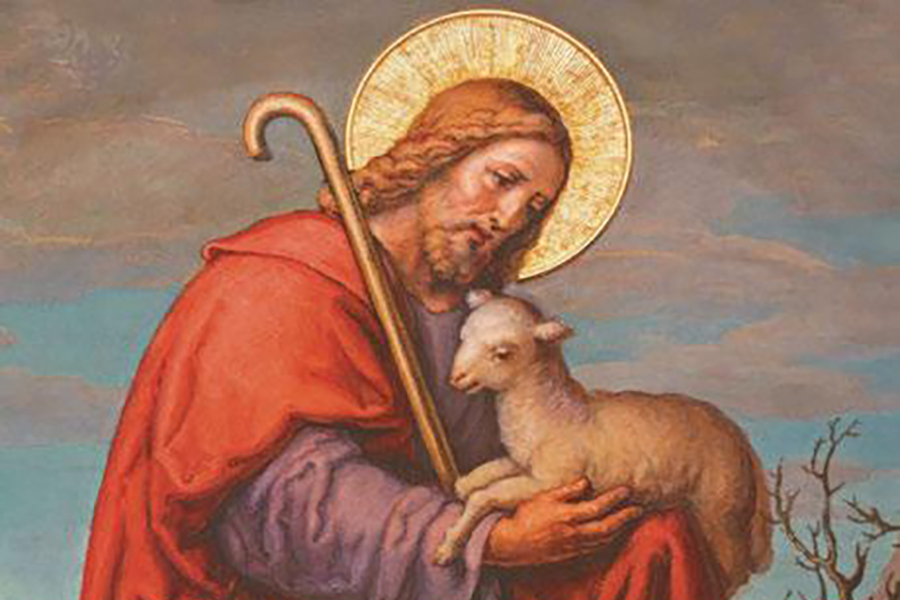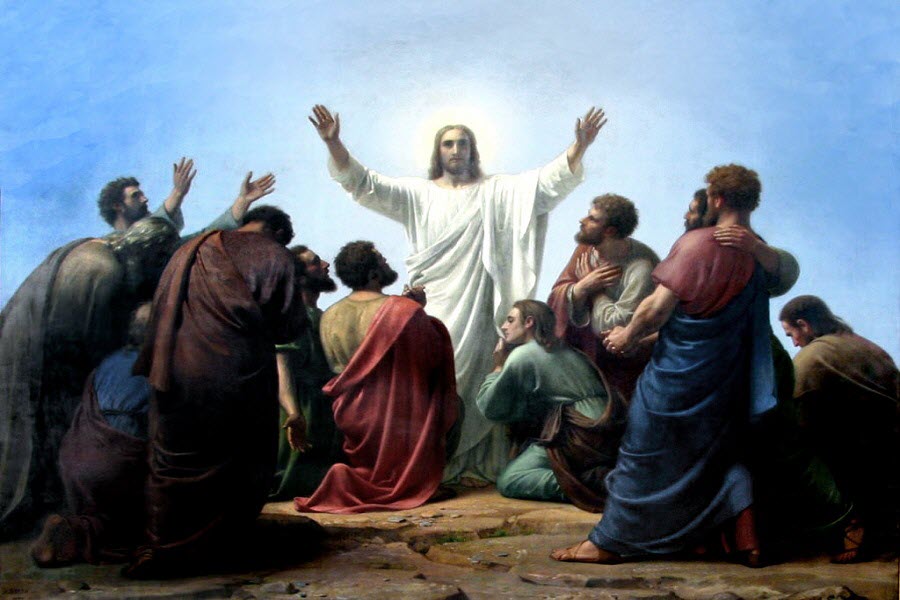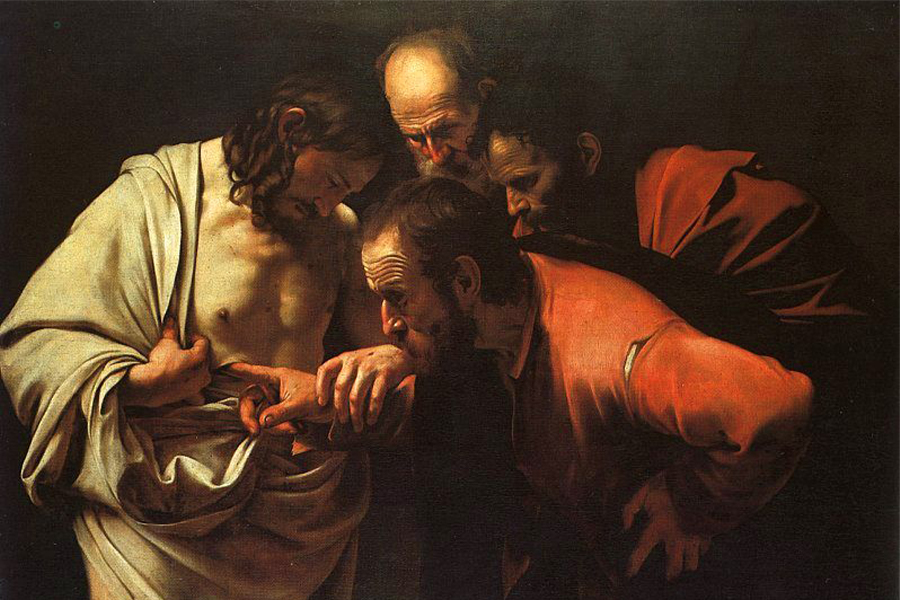St. Francis of Assisi Weekly Reflections

I Am The Vine
04-28-2024Weekly ReflectionWe Celebrate Worship Resource, Vol. 49, No. 1In John’s Gospel, after Jesus washes his disciple’s feet at the Last Supper, he speaks to them at length about the Father and about his own mission. Knowing what is about to happen, he assures them that, like a vine and its branches, he will always remain in them and he calls to them to remain in him. The Father is the vine grower, removing branches that do not bear fruit and pruning the ones that do, so that they will produce even more. In another sense, the Father is the roots of the vine, anchoring and sustaining the entire plant, enabling Jesus to turn to his Father for strength and reassurance in the Garden of Gethsemane as well as on the cross itself. Paul (still referred to as Saul here) needed that kind of connection during his first days as a follower of Christ: he needed that kind of connection during his first days as a follower of Christ: he needed his brothers and sisters to protect him and vouch for him in Jerusalem before he went to bear fruit all over the world. We now are called to bear fruit ourselves—for those who hunger for justice, for reconciliation, for hope, for kindness, and for peace. As we do so, we are nourished on this blessed vine by Jesus and sustained by the Father.
When do you recognize the nourishment and sustenance you receive from the vine? How do you refresh that connection when you feel it weakening?
Yo Soy La Vid
En el evangelio de Juan, después de que Jesús lava los pies de sus discípulos en la Última Cena, les habla extensamente sobre el Padre y sobre su propia misión. Sabiendo lo que está por suceder, les asegura que, como la vid y sus sarmientos, él siempre permanecerá en ellos y los llama a permanecer en él. El Padre es el viñador, que quita los sarmientos que no dan fruto y poda los que sí, para que produzcan aún más. En otro sentido, el Padre es las raíces de la vid, que ancla y sostiene toda la planta, permitiendo a Jesús volverse a su Padre en busca de fuerza y seguridad en el Jardín de Getsemaní, así como en la cruz misma. Pablo (aquí todavía se refiere a Saulo) necesitaba ese t ipo de conexión durante sus primeros días como seguidor de Cristo: necesitaba ese tipo de conexión durante sus primeros días como seguidor de Cristo: necesitaba que sus hermanos y hermanas lo protegieran y atestiguar por él en Jerusalén antes de que fuera a dar frutos por todo el mundo. Ahora estamos llamados a dar frutos nosotros mismos, para aquellos que tienen hambre de justicia, de reconciliación, de esperanza, de bondad y de paz. Al hacerlo, somos nutridos de esta vid bendita por Jesús y sostenidos por el Padre.
¿Cuándo reconoces el alimento y sustento que recibes de la vid? ¿Cómo refrescas esa conexión cuando sientes que se debilita?
Strengthening Your Faith
04-28-2024Question of the WeekReading I: Acts 9:26-31 - Saul Visits Jerusalem
Reading II: 1 John 3:18-24 - The Actions of Believers
Gospel: John 15:1-8 - The Vine and the Branches
Key Passage: [The vine grower] removes every branch in me that bears no fruit. Every branch that bears fruit he prunes to make it bear more fruit. (John 15:2)
Adults: When have you been “pruned” by your experiences in a way that led to greater abundance?
Kids: When have you felt stronger or better because you did something hard to help another person?
Fortaleciendo Tu Fe
Lectura I: Hechos 9:26-31 - Saulo visita Jerusalén
Lectura II: 1 Juan 3:18-24 - Las acciones de los creyentes
Evangelio: Juan 15:1-8 - La Vid y los Pámpanos
Pasaje Clave: [El viñador] quita en mí todo sarmiento que no da fruto. Cada rama que da fruto la poda para que dé más fruto. (Juan 15:2)
Adultos: ¿Cuándo han sido “podados” por sus experiencias de una manera que los condujo a una mayor abundancia?
Niños: ¿Cuándo te has sentido más fuerte o mejor porque hiciste algo difícil para ayudar a otra persona?

I Am the Good Shepherd
04-21-2024Weekly ReflectionWe Celebrate Worship Resource, Vol. 49, No. 1“I am the good shepherd,” Jesus tells his disciples, “[who] lays down his life for the sheep” (John 10:11). Much later, after Jesus’ death and resurrection, his disciples realized that he meant that literally. Jesus loves us and cares for us so much that he sacrificed his life for us, giving his life to save us. He calls us now to care for those we love, to put their needs and desires before our own. In this way, we imitate him, our Good Shepherd. Moreover, he tells his disciples that he is also the good shepherd for the “other sheep that do not belong” (10:16), Indeed, he gives his life on the cross so that all may be saved. In today’s first reading, Peter invokes this saving power after healing a handicapped person, who could be called one of the “other sheep that do not belong.” Peter invokes this saving power over illness, injury, and even death. Similarly, we are challenged to care not only for those we love, but also for the other sheep that do not belong, for were are, through God’s love, all children of God.
How can you imitate the Good shepherd in caring not only for the members of your own flock but also for others who “do not belong”?
Yo Soy El Buen Pastor
“Yo soy el buen pastor”, dice Jesús a sus discípulos, “[que] da su vida por sus ovejas” (Juan 10:11). Mucho más tarde, después de la muerte y resurrección de Jesús, sus discípulos se dieron cuenta de que lo decía era literalmente. Jesús nos ama y se preocupa tanto por nosotros que sacrificó su vida por nosotros, para salvarnos. Él nos llama ahora para cuidar a los que amamos, para poner sus necesidades y deseos antes que los nuestros. De esta manera, lo imitamos, nuestro buen pastor. Además, le dice a sus discípulos que él también es el buen pastor para las "otras ovejas que no son de este redil" (10:16), de hecho, da su vida en la cruz para que todas puedan salvarse. En la primera lectura de hoy, Pedro invoca este poder salvador después de curar a una persona discapacitada, que podría llamarse una de las “otras ovejas que no pertenecen”. Pedro invoca este poder de salvación sobre la enfermedad, las lesiones e incluso la muerte. Del mismo modo, tenemos el desafío de preocuparnos no solo por aquellos que amamos, sino también por las otras ovejas que no pertenecen, porque son, a través del amor de Dios, todos los hijos de Dios.
¿Cómo puedes imitar al buen pastor al cuidar no solo a los miembros de tu propio rebaño sino también a otros que “no pertenecen”?
Called To Be Shepherds
04-21-2024Question of the WeekReading I: Acts 4:8-12 - The Stone That Has Become the Cornerstone
Reading II: 1 John 3:1-2 - Recognizing the Son
Gospel: John 10:11-18 - The Good Shepherd
Key Passage: Jesus said, “I am the good shepherd. The good shepherd lays down his life for the sheep.” (John 10:11)
Adults: Whom are you shepherding in your life right now, and who shepherds you?
Kids: Who has been like a shepherd to you by their example? For whom could you be a shepherd?
Llamado A Ser Pastores
Lectura I: Hechos 4: 8-12 - La piedra que se ha convertido en la piedra angular
Lectura II: 1 Juan 3: 1-2 - Reconociendo al hijo
Evangelio: Juan 10: 11-18 - El buen pastor
Pasaje Clave: Jesús dijo: “Yo soy el buen pastor. El buen pastor pone su vida para las ovejas.” (Juan 10:11)
Adultos: ¿A quién estás pastoreando en tu vida en este momento y quién te guía?
Niños: ¿Quién ha sido como un pastor para ti por su ejemplo? ¿Para quién podrías ser un pastor?

Peace
04-14-2024Weekly ReflectionWe Celebrate Worship Resource, Vol. 49, No. 1After Peter rebukes his audience for their responsibility in putting Jesus to death, he offers them an opportunity to make amends: “Repent, therefore, and be converted, that your sins may be wiped away” (Acts 3:19). He ought to know. While the crowds were calling for Jesus’ death, Peter had denied him three times and stayed as far away from him as he could. So too had most of the other disciples. Secretly gathering later in the upper room, having heard that Jesus had risen from the dead, they must have wondered if he would be angry or disappointed in them for abandoning him. But he was not. “Peace be with your,” he said immediately (Luke 24:36), before calling upon them to preach repentance for the forgiveness of sins, which Peter did, boldly and eloquently. Now Peter is preaching to us. We have sinned. We have failed. Yet always Jesus greets us with forgiveness, as he does here today in the breaking of bread. Peace, he offers, the peace of knowing that always, anytime, our sins can be wiped away.
Do you feel that sense of peace that comes from the Lord? How can you pass that on to your neighbor?
La Paz
Después de que Pedro reprende a su audiencia por su responsabilidad al dar muerte a Jesús, les ofrece la oportunidad de enmendarlo: “Arrepiéntanse y conviértanse para que se les perdonen sus pecados” (Hechos 3:19). Él debería saberlo. Mientras la multitud pedía la muerte de Jesús, Pedro lo negó tres veces y se mantuvo lo más lejos que pudo de él. También lo habían hecho la mayoría de los otros discípulos. Reunidos en secreto más tarde en el aposento alto, después de haber escuchado que Jesús había resucitado de entre los muertos, debieron haberse preguntado si él estaría enojado o decepcionado con ellos por haberlo abandonado. Pero no lo fue. “La paz esté con ustedes”, dijo inmediatamente (Lucas 24:36), antes de llamarlos a predicar el arrepentimiento para el perdón de los pecados, lo que Pedro hizo con valentía y elocuencia. Ahora Pedro nos está predicando. Hemos pecado. Hemos fracasado. Sin embargo, Jesús siempre nos saluda con el perdón, como lo hace hoy aquí al partir el pan. Paz, ofrece, la paz de saber que siempre, en cualquier momento, nuestros pecados pueden ser borrados.
¿Sientes esa sensación de paz que viene del Señor? ¿Cómo puedes transmitirle eso a tu vecino?
The Living Christ
04-14-2024Question of the WeekReading I: Acts 3:13- 15, 17-19 - Peter’s Discourse on Jesus’ Resurrection
Reading II: 1 John 2:1-5a - Keeping the Commandments
Gospel: Luke 24:35-48 - Jesus Appears to the Eleven
Key Passage: Jesus said to them, “Why are you frightened, and why do doubts arise in your hearts? Look at my hands and my feet; see that it is I myself.” (Luke 24:38-39)
Adults: What questions about Jesus still arise in the midst of your faith?
Kids: What question would you like to ask someone about Jesus’ appearance to the Apostles?
El Cristo Vivo
Lectura I: Hechos 3:13-15, 17-19 - El discurso de Pedro sobre la Resurrección de Jesús
Lectura II: Juan 2:1-5a - Guardando los Mandamientos
Evangelio: Lucas 24:35-48 - Jesús se led aparece a los once
Pasaje Clave: “¿Por qué se espantan? Por qué surgen dudas en su interior? Miren mis manos y mis pies. Soy yo en persona”. (Lucas 24:38–39)
Adultos: ¿Qué preguntas sobre Jesús surgen todavía en medio de vuestra fe?
Niños: ¿Qué pregunta te gustaría hacerle a alguien sobre la aparición de Jesús a los Apóstoles?

Doubting is Natural
04-07-2024Weekly ReflectionWe Celebrate Worship Resource, Vol. 49, No. 1Thomas is a saint for us all. We all have doubts. Perhaps they’re the nagging little doubts we all have from time to time about our faith. Perhaps they’re big enough to make us turn away. Despite having heard eyewitness testimony from ten of his closest friends, Thomas doubted. He doubted so strongly that he insisted he would not believe unless he saw for himself, leading Jesus to later declare, “Blessed are those who have not seen and have believed” (John 20:29). In one sense, we are those believers Jesus blesses. But in another sense, we can see him, for in baptism we were blessed with eyes of faith. With those eyes, we can see the Lord alive in the world, in the least of our bothers and sisters, in the goodness of those who act with mercy and love, in the Eucharist that we receive today. Doubt is natural, is normal, and is not erased by faith. Most of us who believe still have our doubts. We believe despite our doubts. We look to Thomas, who doubted for us all, and to Jesus, who in his tender mercy returned to the upper room to reassure Thomas that indeed, he had been raised.
How are you reassured of Jesus’ presence? When do you still have doubts?
La Duda Es Natural
Tomás es un santo para todos nosotros. Todos tenemos dudas. Quizás sean las pequeñas dudas persistentes que todos tenemos de vez en cuando sobre nuestra fe. Quizás sean lo suficientemente grandes como para hacernos dar la vuelta. A pesar de haber escuchado el testimonio de diez de sus amigos más cercanos, Thomas dudaba. Dudaba tanto que insistió en que no creería a menos que lo viera por sí mismo, lo que llevó a Jesús a declarar más tarde: “Bienaventurados los que no vieron y creyeron” (Juan 20:29). En cierto sentido, somos esos creyentes a los que Jesús bendice. Pero en otro sentido podemos verlo, porque en el bautismo fuimos bendecidos con los ojos de la fe. Con esos ojos podemos ver al Señor vivo en el mundo, en el más pequeño de nuestros hermanos y hermanas, en la bondad de quienes actúan con misericordia y amor, en la Eucaristía que hoy recibimos. La duda es natural, es normal y no se borra con la fe. La mayoría de los que creemos todavía tenemos nuestras dudas. Creemos a pesar de nuestras dudas. Miramos a Tomás, que dudó por todos nosotros, y a Jesús, que en su tierna misericordia regresó al aposento alto para asegurarle a Tomás que efectivamente había resucitado.
¿Cómo te sientes seguro de la presencia de Jesús? ¿Cuándo todavía tienes dudas?
Following The Example Of Jesus
04-07-2024Question of the WeekReading I: Acts 4:32-35 - Life of the Christians
Reading II: 1 John 5:1-6 - Belief in Jesus Christ
Gospel: John 20:19-31 - Appearance to the Disciples
Key Passage: Now the whole group of those who believed were of one heart and soul; no one claimed private ownership of any possessions; everything they owned was held in common. (Acts 4:32)
Adults: What could you do this week to inspire your family to resemble the early Christians more closely?
Kids: What could you and your family do to help others who are in need?
Siguiendo El Ejemplo De Jesus
Lectura I: Hechos 4:32-35 - Vida de los cristianos
Lectura II: 1 Juan 5:1-6 - Creencia en Jesucristo
Evangelio: Juan 20:19-31 - Aparición a los discípulos
Pasaje Clave: La multitud de los que habían creído tenía un solo corazón y una sola alma; todo lo poseían en común y nadie consideraba suyo nada de lo que tenía. (Hechos 4:32)
Adultos: ¿Qué podrían hacer esta semana para inspirar a su familia a parecerse más a los primeros cristianos?
Niños: ¿Qué podrías hacer tu y tu familia para ayudar a otras personas necesitadas?